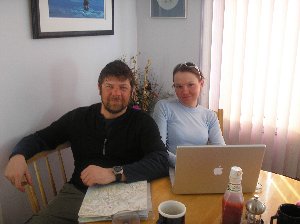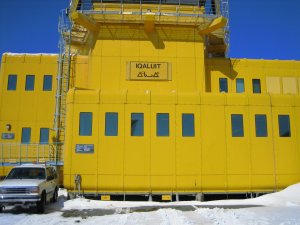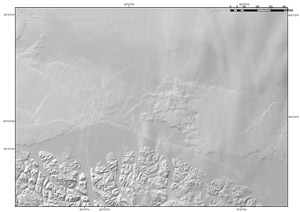May 3, 83 07.46N 77 25.47W

Long day, short miles. We managed to cover about 2.25 miles today. But considering the ice conditions, we really couldn't have done one inch more. Once again, we find ourselves iin the tent and tired.
It is a good tired however. We have overcome some major obstacles to our forward progress. At one point, we were easing (or trying to ease) our sleds down a 10 foot drop of ice. Traveling across the rubbled ice isn't much easier either, but we manage. The trick is to try and avoid the large car-sized chunks. There is considerable back and forthing finding the 'easiest' path.
Despite all this, we have managed to keep in an almost straight bearing north. Using our shadows helps a lot. At noon, our shadows point straight north, at 1 pm they point 15 degrees to the east, 2 pm 30 degrees, and so on. All the pressured ice helps too as larger chunks provide recognizable reference points.
The ice is so thick and massive here that is hard to for us to imagine that it will be gone in summer in just 50 years. That means no more polar bears--which by the way can't be too far away because we just ran across some arctic fox tracks. Up here, where there's a fox, a polar bear is near.
We got out the dictionary today and chose a word for the day - intricate. The reasons: 1) two inch long crystals of hoar frost that cover every chunk of ice. 2) our route today.
May 2, 83 05.31'N:77 26.26'W

It's almost like we never left. So much of traveling on the Arctic Ocean is routine. Waking up this morning in the tent was so familiar that it seemed eerily like last year. That is, until we looked outside.
We opted to sleep in as we didn't get dropped off at Cape Discovery until very late yesterday, but we were on the trail soon enough. Looking around it was easy to see we weren't in Russia anymore. The mountains of Ellesmere Island in the background, the Ward Hunt ice shelf looming to the east. And sunshine. Beautiful bright manificent sun. (we had two or three suuny days total last year.)
We opted for skis for the fist hour of travel. It would be the last time we would wear them all day. The ice we encountered after the flat ended was massively pressured, drifted in and filled with large swaths of rubbled ice. It was slow progress at best but we still managed to pick our way through .
So many times we'd scout the ice ahead and think, 'there's no way through this.' but slowly, and with lots of boat twisting, we would make it.
And make it we did. Today we travelled a mind numbing 3.75 miles - an amazing distane for us so early with bad ice.
At the end of our first full day we are optimistic about the future. We are a bit nervous, too, with only two days ticked off of an unimaginable 120. But most of all, we are just really tired.
April 30, Resolute
The expedition got off to an inauspicious start today as we experienced a slight role shift. With nearly 70 Spaniards needing to get to the airport, we became, of all things, taxi drivers.
They say adventures come in all shapes and sizes, and driving a van full of Spanish tourists singing their national anthem (judging by the volume and fervor of their efforts) will not be long forgotten. But it was a means to an end: our equipment and boats were at a cargo warehouse near the airport.
With the safe arrival of our gear came other welcome news: there is a possibility of a 2 pm departure for northern Ellesemere Island and our take off. The information was rude awakening to our small group. We have to get packed and ready to go by Monday morning. Needless to say, we got to work immediately. Rationing fuel, a final gear check, putting greenpeace stickers... our small room is a flurry of expedition preparation.
We are ready to go, but our experience tells us to check our excitement. The 'Ice Warriors' waited eight days for good flying conditions. This is the north where anything can change anytime. The ice, the snow. Even explorers: arctic travelers one minute, taxi drivers the next.
April 30, Resolute

"I've got six or seven balls on the air right now," the charter flight company representative stated flatly over the phone. "After I grab on to a few I'll give you a call." The statement left little doubt to our fate over the next few days. Whether in Russia or Resolute, this is still the north and things happen a bit differently here.
Like our gear for example. We had thought that shipping our boats, snow shoes and every other piece of equipment nearly three weeks ago would assure its safe arrival. Not so. After calling and waiting and waiting and calling, we finally managed to talk to someone in Ottawa (of all places) who was able to pinpoint our supplies somewhere 19,000 feet above northern Baffin Island traveling at approximately 278 mph toward our present location. With nothing left to do but sit and wait, we settled in to another comfortable dinner at the south camp inn.
Despite the outward appearance of lethargy, our day has been filled with chance conversations with other adventurers and scientists. One man, Joyche, is leading a small group of people to the magnetic north pole (at least where it was 10 years ago). They have been waiting for over a week to partake in a trip lasting just a few days. The Ice Warrior team (two members pictured) has also returned from a five week Ellesemere Island expedition. Their journey, in concert with Jim Mcneil's aborted North Pole journey, was collecting snow samples for Dr. Tom Grenfell of the University of Washington. We also met with Dr. Grenfell--who is in Resolute to conduct on-site analysis of the snow samples--to discuss our own sampling procedures
The rest of the Greenpeace team is keeping busy. Mark has been preparing the video cameras for tomorrow as well as our journey north. Steve has been doing the same except with his still cameras. Mike, as usual, is neck deep in electronics. Rounding out the team is Melanie who has been amassing her notes on global warming.
April 29

Waking up in an Ottawa hotel with a courtesy call is hardly the stuff of a great expedition story. But, for us, mundane is far superior to the chaos of Russia last year.
For the most part our day was spent sitting. A jet to Iqaluit, a short layover, then on to Hall Beach, Nanisivik and finally Resolute. With each stop, we could feel the air get colder. Iqaluit was snow covered but pleasant. Nanisivik was downright chilly.
The fabled 'Northwest Passage' is right outside our window and it is exciting to be back in the North of our dreams. Several teams from guided expeditions are filtering in and out of our hotel. There is an air of expeditions and history that is almost palpable.
The only down side to our journey is the fact that a large group of Spaniards may have commandeered our planes. A 'personnel shift' has left us on the short end of the Twin Otter plane list. Hopefully, all will be sorted out tomorrow. For now, we are relaxing, checking emails and doing all the things that normal people do in their daily lives while we still can.
April 27, Grand Marais, Minn.

We leave Minnesota in a few hours. Good bye spring and summer, hello ice. However, the latest satellite image from our departure point off the north coast of Ellesemere Island shows spring coming to the Arctic as well.
Last year, we abandoned our attempt to make the first summer crossing of the Arctic Ocean due to unfavorable ice conditions and ocean currents. But as you know, we are again teaming up with Greenpeace and returning to thin ice with a new mission: to protect what could become global warming's first victim-the polar bear.
Greenpeace is at the forefront of taking action to rescue the polar bear from extinction, including a groundbreaking lawsuit filed with other environmental groups to list the species under the Endangered Species Act due to global warming. If successful, it would be the first time a mammal has been listed as endangered and given protections as a result of global warming.
Greenpeace climate experts have teamed up with scientists from the National Snow and Ice Data Center, who have equipped the explorers with tools to document melt water pools, snow depth and ice thickness. Since no one has undertaken an expedition like this in the Arctic in summer, the explorers will provide scientists with measurements that have never been taken before. Scientists are calling the data that the explorers will gather the "Holy Grail" of sea ice studies.
The Arctic Ocean and the polar bear have a dramatic story to tell. Hopefully our journey on the Arctic Ocean will help better illustrate the need for immediate action.
